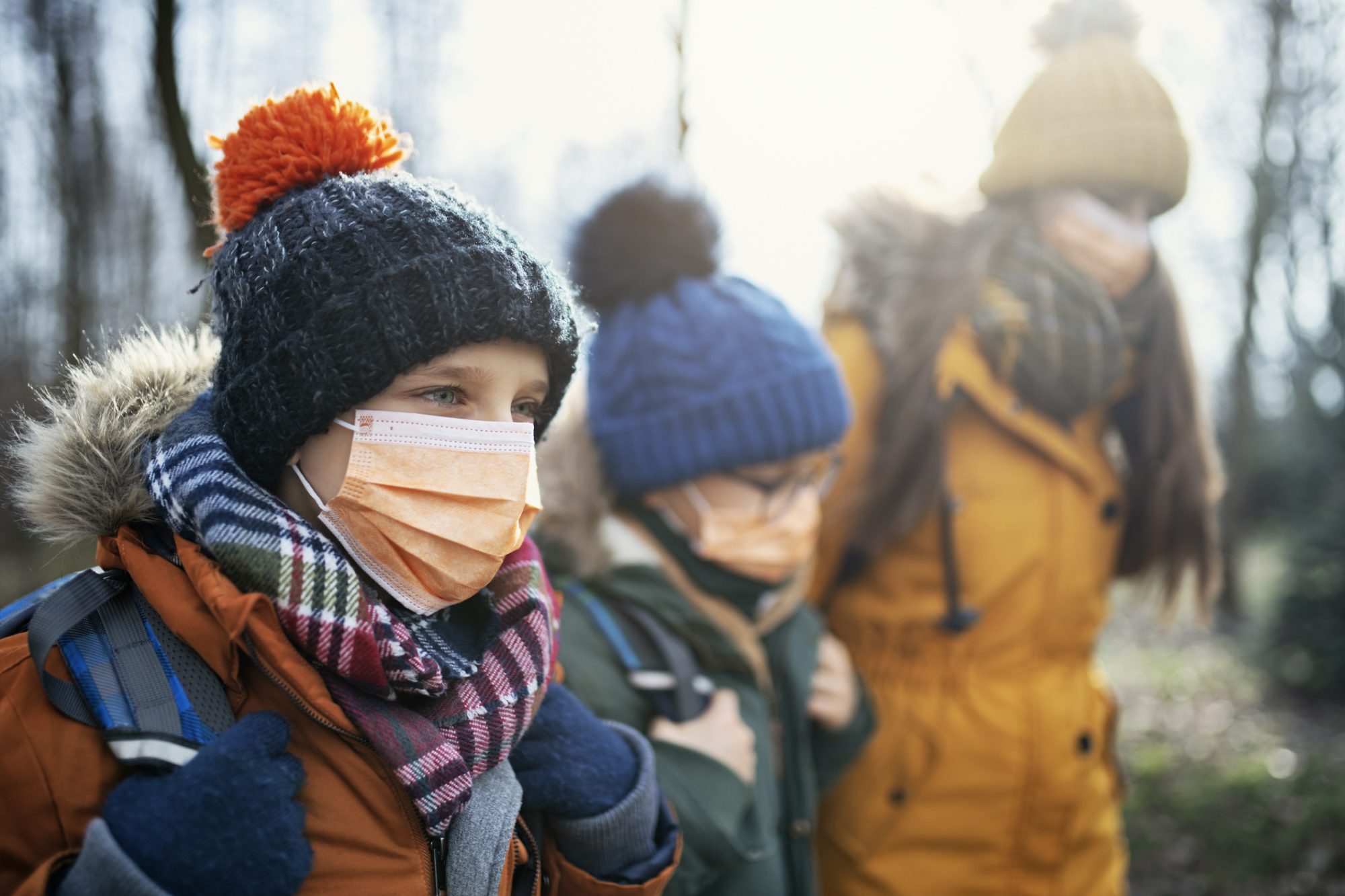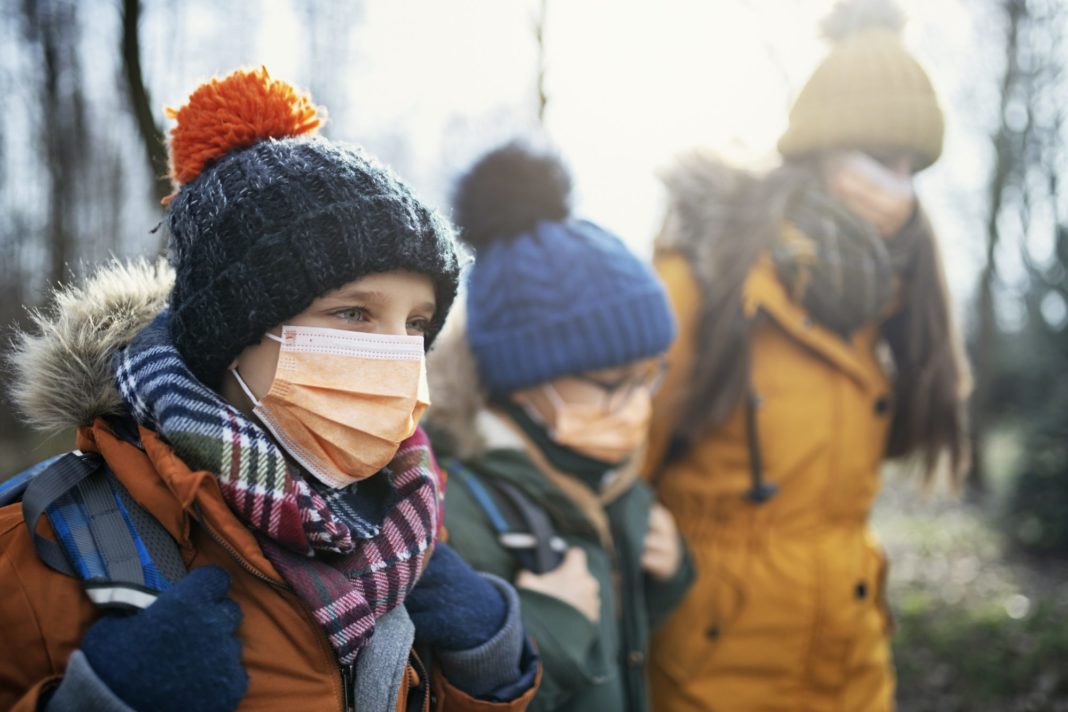The COVID-19 pandemic is still raging, with more than 34.4 million recorded cases in America. And while several coronavirus strains have been discovered over the months—including the B.1.1.7 alpha strain—experts are now focused on the extremely transmissible Delta variant that's currently predominant in the U.S.
The Delta variant is the fastest-growing strain in the country, says Steven Abelowitz, M.D. FAAP, a board-certified pediatrician who serves as the medical director and president of Coastal Kids pediatric medical group. Indeed, Delta is currently accounting for 83 percent of all coronavirus cases in the U.S., and it has caused the Centers for Disease Control and Prevention (CDC) to change its mask guidance again. The organization now recommends that vaccinated people wear masks indoors in areas of high or substantial transmission.
Parents are especially worried about the Delta variant because it's been associated with a possible rise in hospitalizations. It also seems to affect kids more severely—possibly because people under 12 years old aren't eligible to get vaccinated yet. "We have many unvaccinated (or partially vaccinated) adults and adolescents who may spread the variant to children," says Dr. Jim Versalovic, M.D., Ph.D, pathologist-in-chief and interim pediatrician-in-chief at Texas Children's Hospital, which has already seen several cases of the Delta variant in children.
Although the pandemic appeared to be improving, Delta has caused a recent COVID-19 spike…just in time for back-to-school season. So how dangerous is the Delta variant, and what does it mean for pandemic living? Here's everything parents need to know to keep their families safe.
Where Did the New COVID-19 Variant Come From?
The Delta variant—also known as B.1.617.2— has multiple mutations that differentiate it from other strains of COVID-19. "It has basically evolved into a more transmissible virus," explains Dr. Versalovic.
Delta was first detected in India in late 2020, where it caused waves of infections and deaths, but it's now been confirmed in at least 105 counties. It even delayed reopening efforts in the United Kingdom, where it has been spreading rapidly.
In America, the Delta variant makes up 83 percent of COVID-19 cases, based on estimates from the CDC. It overtook the former dominant variant—the B.1.1.7 Alpha variant from the United Kingdom—in early July. Areas with low levels of vaccination appear to be hit the hardest by Delta.

Is the Delta Variant More Dangerous?
The Delta variant is more infectious than other predominant strains of COVID-19. In fact, studies have shown that it's 40 to 60 percent more transmissible than the B.1.1.7 Alpha variant—and B.1.1.7 itself is 50 percent more contagious than the original COVID-19 strain from Wuhan. In other words, Delta is around 75 percent more transmissible than the original strain of COVID-19, according to F. Perry Wilson, M.D., a Yale Medicine epidemiologist, in an article from Yale Medicine.
Due to limited research, experts aren't quite sure whether Delta is more dangerous. But "there is concern it may cause severe disease," says Dr. Versalovic. A recent Scottish study suggests Delta is associated with double the hospitalizations as the B.1.1.7 Alpha variant (the current predominant strain in the U.S.). More research needs to be conducted on the subject before making a definite conclusion—especially in regards to long-term complications.
Along those lines, the jury is still out on whether the Delta variant is more lethal than other strains. In a recent news conference, Dr. Mike Ryan, the executive director of the World Health Organization (WHO) health emergencies program, said Delta could be deadlier because it's "more efficient in the way it transmits between humans and it will eventually find those vulnerable individuals who will become severely ill, have to be hospitalized and potentially die."
The vast majority of those hospitalized with Delta are unvaccinated people. "This supports the importance of vaccines in all population groups," says Dr. Abelowitz. Of course, this means children are at higher risk, as they're not yet able to get vaccinated.
What are the Symptoms of the Delta Variant?
Experts have found that the Delta variant might have different symptoms than other strains of COVID-19. "It seems to present more often in upper respiratory tract," says Dr. Abelowitz. Patients often experience runny nose, fever, headache, and sore throat. Other side effects commonly associated with the coronavirus—like coughing or loss of smell—seem to be less common.
Some parents might mistake the Delta variant for allergies or a cold, but unfortunately, this misunderstanding can help it spread even more. Dr. Abelowitz recommends getting your child tested if they experience symptoms after a known exposure, or if there's significant transmission in your community. But remember that colds and allergies exist too, so ask your health care provider if you're unsure whether to get a COVID-19 test.
Does the COVID-19 Vaccine Protect Against the Delta Variant?
More than half of American adults are fully vaccinated against COVID-19. And while "it seems our vaccines are effective against the Delta variant," says Dr. Versalovic, research suggests that breakthrough infections are more likely. That said, breakthrough infections remain rare, and the vast majority are mild or asymptomatic. Out of the 161 million fully vaccinated Americans, 5,914 people have developed breakthrough infections that led to hospitalization or death, says the CDC. Most of these people were immunocompromised or elderly.
Also, vaccinated people might be able to spread the Delta variant to others—partly because infected people contain more viral load. One Chinese study suggests that viral loads were about 1000 times higher with Delta than other variants. That's partly why the CDC now suggests that vaccinated people wear masks in areas of high or substantial transmission.
Pfizer is about 88 percent effective at preventing symptomatic infection two weeks after the second dose, said Anthony Fauci, M.D., director of the National Institute of Allergy and Infectious Diseases, in a White House COVID-19 Task Force briefing. It's also 96 percent effective against severe disease that results in hospitalization. Experts aren't completely sure about this estimate yet, as research varies widely. One study in Israel estimates that Pfizer is 35 percent effective at preventing infection and 91 percent against against serious COVID-19 symptoms.
That said, one dose of the Pfizer vaccine appears less effective against the Delta variant than it is against other strains. A study by Public Health England, published on May 22, found that one jab of Pfizer was 33 percent effective against the Delta variant (in comparison, one dose reduced the risk of the B.1.1.7 Alpha variant by 50 percent). Being fully vaccinated offers significantly more protection than partial vaccination.
Based on results of a lab study, Moderna also says its vaccine works against the Delta variant. A Canadian study suggested that one dose of Moderna provided 72 perfect effectiveness against Delta (there isn't data for two doses). Some experts think Moderna provides comparable protection as Pfizer against Delta.
It's important to note that the Pfizer and Moderna vaccines are made with sophisticated mRNA technology, and the components can be altered relatively quickly, says Rosemary Olivero, M.D. head of the pediatric infectious disease program at Helen DeVos Children's Hospital. "The hope is that if there needs to be [more adjustments to the vaccines in the future], it can be done."
It's also possible that vaccinated individuals will need a booster shot in the future. Indeed, Pfizer announced that it developed a booster that's currently being tested, as efficiency could wane over time.
Experts stress that vaccination is important for preventing severe disease, hospitalization, and death from COVID-19. According to CDC Director Dr. Rochelle Walensky, 99.5 percent of recent hospitalizations have been in unvaccinated people. Those without vaccination "remain susceptible, especially from the transmissible Delta variant, and are particularly at risk for severe illness and death," she said at a press briefing.
How to Protect Your Family
"Pediatricians worry that if [the Delta variant] spreads further, it could lead to schools not reopening, sports and camps being closed, and all of that having an adverse effect on the mental health of children," says Dr. Abelowitz. Getting vaccinated is key to slowing the spread of the coronavirus, warding off future lockdown restrictions, and preventing other dangerous variants from emerging.
Nobody under 12 years old is eligible to get vaccinated currently, but that could change in the coming months because pediatric clinical trials are currently underway. Pfizer hopes to approve its vaccine for emergency use in elementary school kids by fall, and Moderna isn't far behind. In the meantime, the CDC and Food and Drug Administration (FDA) encourage every eligible person to receive the vaccine. "The spread of the Delta variant has certainly added to the urgency of vaccinations in everyone 12 and up," adds Dr. Versalovic.
It's also vital that unvaccinated people practice safety guidelines set forth by the government, which included social distancing, wearing masks in public places, and washing your hands often.

































